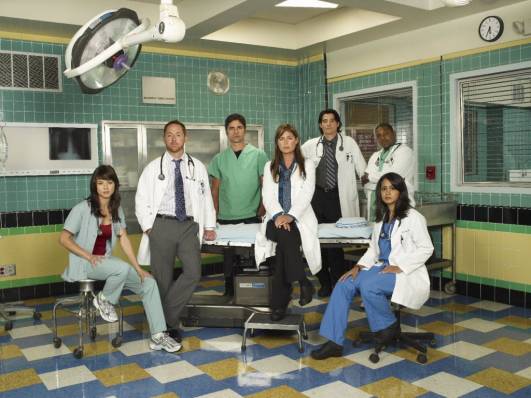As someone who works in the Emergency Department, I can say without a doubt that TV/Movies always try to sensationalize our jobs, but fail to show how stressful our jobs really are, or how much responsibility we have.
In a nutshell, becoming a doctor is grueling, and being a doctor (especially an ER doctor) isn't the bed of roses that you might imagine. While the job is frequently hellacious, it can also be far more rewarding than other jobs. What other job gives you the ability to save lives on a regular basis? What other job gives you the chance to forge emotional connections with people who were strangers five minutes ago? I've had many patients reveal things to me they said they'd never told their own doctor or even spouse. If you have a knack for dealing with people, they will open up to you in remarkable ways. That instant candor can help you help them. As an ER doctor, you will also have the opportunity to meet and get to know thousands of people per year.
Lets take a look at what we really do, okay? The hours are indeed very long. Just to become a doctor, I worked more hours than some people do in their entire lives.
You may work only 40 hours per week while on duty in the ER -- but as a resident physician you will work as much as 80 hours per week (where there is no extra pay, you are salary, and you get a stipend which is probably less than what the nurse who works besides you makes).
You will have many other work obligations to fulfill for which you aren't paid a penny as well, including proofreading and signing dictated charts (my charts for a few shifts were often as long as a book), attending multiple staff and committee meetings, fulfilling your continuing medical education requirements (and the many hours of studying that you should do in addition to that legislated minimum), filling out insurance forms, and dealing with the legal system.
You may be compelled to appear in court to testify as an expert witness about medical care rendered to one of your patients, or you may be sued even if you give flawless care and cover your butt in every way possible.
Then there's the matter of working overtime. As an ER doctor, you will often work up to three hours after shifts were scheduled to end just to dictate charts and complete the care for my pending patients instead of transferring them to the doctor coming on for the next shift. Thus, what is supposed to be a 12-hour shift could easily turn into a 15-hour marathon during which I, as generally one of the few ER docs on duty, receive NO guaranteed breaks to eat, recuperate, or even empty my bladder.
I'd occasionally have time to sit down for 15 minutes and enjoy a leisurely lunch, but more often than that I would drink a protein shake in 7 seconds or less and resume working. The foregoing factors could turn a scheduled 40-hour workweek into a 60-hour one. Notably, you are not paid for those hours of overtime.
Most people make time and a half for overtime in the United States, but corporations who pay doctors are exempt from this requirement; they can (and do) pay them nothing.
To become a licensed doctor, you will generally work for many years before you see your first true dollar of profit. Incidentally, your first paycheck as an intern isn't usually real profit because you're still in the hole because of student loans.
Instead of the typical 40 hours per week, let's say that you average 55 or 60 as an attending and much more than that as an intern and resident. That won't leave you with much free time, but what little time you have is often rendered useless because of lingering fatigue resulting from inadequate sleep and a chronically out of whack body clock. As an intern/resident and later as an ER doctor, you will work day shifts, afternoon shifts, and night shifts.
As an ER doctor, the federal government obligates you to see every patient who walks in the door, whether or not they can pay for their care, even if what they have is clearly not an emergency. I would not object to this if the government fairly compensated me for that care, but they don't. In fact, I could be fined $50,000 per occurrence by refusing to see a patient.
And yes, the ER does move fast if you are in a level 1 trauma center, at times we will have 50 beds full, and have another 50 people in our waiting room...
In reality being an ER physician is one of the toughest most rewarding jobs. Not everyone can say they saved a life.
